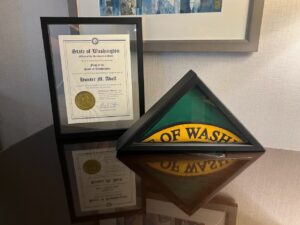
Note: The following e-newsletter was sent to Sen. Padden’s subscribers May 31, 2023. To subscribe to Sen. Padden’s newsletter, click here.
Dear friends and neighbors,
I hope all of you enjoyed the Memorial Day weekend. While the three-day weekend provides a great opportunity for us to gather with family and friends, it’s also a chance for us to honor our veterans who gave their lives to our nation so that we, as Americans, can enjoy our cherished freedoms and rights.
Thank you to our veterans, living and dead, who served our great nation, and thanks to those who currently serve in our military.

Members of the Rodgers High School Junior ROTC during the Memorial Day ceremony at Pines Cemetery.
On Monday, my wife Laura and I attended the Memorial Day ceremony, sponsored by Spokane Valley American Legion Post 241 and held at Pines Cemetery to honor our fallen veterans. As anyone who has been to one of these ceremonies knows, it is a somber occasion that makes you appreciate even more the tremendous sacrifice these soldiers made to serve and protect America. It also helps you understand the profound loss experienced by families who had a beloved relative join the service, never to return.

Sen. Padden talks about the 2023 legislative session during Saturday’s 4th District town hall meeting.
On Saturday morning, I joined my 4th District seatmates, Reps. Leonard Christian and Suzanne Schmidt, in participating in a town hall meeting at CenterPlace in the Spokane Valley. Nearly 60 people attended the one-hour event, which included a recap of the recently ended 2023 legislative session, followed by a question-and-answer period. A special thank-you goes to those who took time during their three-day weekend to join us at the town hall.
If you have questions about how to participate in state government this year or thoughts to share on anything in this e-newsletter, please give me a call or send me an email.
Thank you, as always, for the honor of serving as your state senator!
Best Regards,

Senator Mike Padden
Tomorrow is deadline for some to opt out of WA Cares program
WA Cares, our state’s new long-term care program, will be activated on July 1, despite strong efforts by legislative Republicans to repeal or modify this costly and flawed program.
The program will be funded by a very expensive payroll tax, in which those making $50,100 (the median income in Washington) will have $24 a month (or $288 a year) taken out of their paychecks unless they have already obtained an exemption approval letter by purchasing private, long-term care insurance.
The WA Care program provides a maximum lifetime benefit of only $36,500, payable at a maximum of $100 per day – even though the cost of care currently averages up to more than three times that. This program is not only extremely expensive for workers, it also falls short of providing benefits at the level many people will actually need.
I was one of several Republican legislators who offered bills to stop WA Cares from becoming reality. In 2022, I introduced Senate Bill 5234, which sought to repeal the WA Cares program and its payroll tax. However, Senate Democrats did not allow it to even receive a public hearing in committee.
The state Employment Security Department says certain individuals in Washington can still apply for an exemption from the payroll tax that funds WA Cares, but the deadline to apply is tomorrow (June 1).
People who are still eligible to opt out of WA Cares include:
- Workers who are a spouse or domestic partner of an active-duty U.S. armed forces member.
- Workers who work in Washington but live out of state.
- Workers who have a temporary nonimmigrant visa like a H-2A or H-1B visa.
Those who want to apply for an exemption should follow the instructions available here.
Governor signs three Padden bills after session ends

I was on hand to watch Governor Inslee sign Senate Bill 5058, which will make it easier to build smaller condominium buildings. Also at the signing ceremony were Tricia Gullion (left) of the Building Industry Association of Washington and Spokane City Council member Betsy Wilkerson (right).
During the weeks after the 2023 regular session ended on April 23, Governor Inslee signed three more bills that I introduced this session.
Senate Bill 5058 exempts buildings with 12 or fewer units that are no more than two stories high from the definition of “multiunit residential building.” Washington has one of the lower homeownership rates in the nation, and this bill would help our state address this problem. SB 5058 is one of several measures approved by the Legislature this year that aim to boost the supply of housing in Washington. This bill should result in condos that are less expensive, which should encourage more people to become homeowners.
Senate Bill 5096 aids businesses looking to follow a business model that allows workers to be owners. Schweitzer Engineering, which has operations in the Spokane Valley, supported this bill, as did Ownership America.
Senate Bill 5218 makes mobility-improving equipment tax-exempt. This will help make motorized wheelchairs and similar equipment much less expensive to buy, helping people with disabilities to save money while also helping them maintain their independence. (This recent Seattle Times story on the Seattle Mariners recognizing ALS patients mentions how a motorized wheelchair can cost $60,000 nowadays.)
The laws created by all three bills take effect on July 23, as does Senate Bill 5033, another measure signed by the governor that I introduced this year. SB 5033 imposes longer sentences on sexually abusive jail and prison guards. I introduced the bill after KING-TV in Seattle reported about a prison guard in Clallam County who sexually abused several female inmates.
Legislative session recap given at Spokane Valley City Council meeting
Last night I attended the Spokane Valley City Council meeting, during which Brianna Murray provided a review of this year’s legislative session in Olympia. Brianna did a nice job discussing the highlights and lowlights of the session. Please click here to watch the city council meeting, including Brianna’s presentation.
Fuel prices rise sharply in recent days

If you noticed that fuel prices have risen significantly in recent days, you are now alone. This story published by The Center Square earlier this week pointed out the sharp increase in fuel prices over the three-day weekend.
The story’s lead paragraphs say it all:
The average price of a gallon of regular unleaded was sitting at $4.68 statewide on Monday, up from $4.60 the week prior according to AAA data.
This holiday weekend price hike marks the 17th week this year of rising fuel prices for Washingtonians, following the implementation of the new carbon tax earlier this year.
As the story implies, one of the main culprits for the fuel price spike is the cap-and-trade program that went into effect in January. Since cap-and-trade became reality, fuel prices in Washington have become even higher than in Idaho. According to the state-by-state fuel price comparison compiled by AAA, regular unleaded gas in Washington costs an average of $4.697, compared to $3.857 in Idaho. This price difference of roughly 85 cents a gallon is bound to hurt Washington gas stations located near the Idaho border, as gas consumers will be tempted to drive a few miles east to save on fuel.
Updated 4th District government guide still available
My office recently produced and mailed an updated version of a 4th District government guide to many households in our district. If you did not receive a government guide and would like one, simply contact my district office at 509-921-2460. You also may pick up a free copy of the government guide at any of these locations:
Millwood City Hall…………………….9103 E Frederick Ave., Spokane
Argonne Library………………………..4322 N Argonne Road, Spokane
Spokane Valley City Hall……………10210 E Sprague Ave., Spokane Valley
Spokane Valley Library………………12004 E Main Ave., Spokane Valley
Liberty Lake City Hall………………….22710 E Country Vista Drive, Liberty Lake
Liberty Lake Library……………………23123 E Mission Ave., Liberty Lake
Otis Orchards Library…………………22324 E Wellesley Ave., Otis Orchards
Spokane Valley Senior Center…….2426 N Discovery Place, Spokane Valley
Contact us!
If you have a question or concern about state government, please do not hesitate to contact our office. During the interim we are conducting business from our district office in Spokane Valley. We are here to serve you!
Phone: (509) 921-2460
Email address: Mike.Padden@leg.wa.gov
PLEASE NOTE: Any email or documents you provide to this office may be subject to disclosure under RCW 42.56. If you would prefer to communicate by phone, please contact Sen. Padden’s Olympia office at (360) 786-7606.
To request public records from Sen. Padden, please contact Randi Stratton, the designated public records officer for the Secretary of the Senate and Senate members.
































